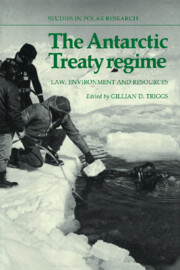Book contents
- Frontmatter
- Contents
- List of contributors
- List of Antarctic Treaty Parties
- Foreword
- Introduction
- Frontispiece: Map of national claims
- Part I Antarctica: physical environment and scientific research
- Part II The Antarctic Treaty regime: legal issues
- 4 Introduction
- 5 The Antarctic scene: legal and political facts
- 6 The Antarctic Treaty system: a viable alternative for the regulation of resource-oriented activities
- 7 The relevance of Antarctica to the lawyer
- 8 The Antarctic Treaty system: some jurisdictional problems
- Part III The Antarctic Treaty regime: protecting the marine environment
- Part IV The Antarctic Treaty regime: minerals regulation
- Part V Whither Antarctica? Future policies
- Part VI Conclusion
- Selected reading
- Appendix 1
- Appendix 2
5 - The Antarctic scene: legal and political facts
Published online by Cambridge University Press: 20 January 2010
- Frontmatter
- Contents
- List of contributors
- List of Antarctic Treaty Parties
- Foreword
- Introduction
- Frontispiece: Map of national claims
- Part I Antarctica: physical environment and scientific research
- Part II The Antarctic Treaty regime: legal issues
- 4 Introduction
- 5 The Antarctic scene: legal and political facts
- 6 The Antarctic Treaty system: a viable alternative for the regulation of resource-oriented activities
- 7 The relevance of Antarctica to the lawyer
- 8 The Antarctic Treaty system: some jurisdictional problems
- Part III The Antarctic Treaty regime: protecting the marine environment
- Part IV The Antarctic Treaty regime: minerals regulation
- Part V Whither Antarctica? Future policies
- Part VI Conclusion
- Selected reading
- Appendix 1
- Appendix 2
Summary
Antarctica of today is a continent of peace and cooperation. Eighteen countries with diverse political and economic systems successfully cooperate in managing all matters concerning the southern continent. A further 14 have expressed their political belief in the Antarctic Treaty system by adhering to the Antarctic Treaty. The last few years have seen an important increase in the number of new member states.
When one considers the potential for conflict in the Antarctic the situation of today is quite remarkable. In spite of widely differing conceptions as to territorial sovereignty, and undaunted by fluctuations in the global political climate over the last 25 years, the Antarctic Treaty Consultative Parties have unfailingly pursued the high goals set by themselves in the Antarctic Treaty. As will be seen from my following remarks, the achievements by the Consultative Parties in preserving the Antarctic from political and juridical strife are both considerable and, in their consequence, of benefit to all mankind.
In order to assess the political and legal facts in Antarctica today, it is necessary briefly to look back in time to the beginning of this century. I shall not endeavour to go into the details of the grand days of the Antarctic explorers of earlier times. It is of importance to keep in mind, however, that human enterprise has been significant on and around the southern continent for a very long time.
During the twentieth century, exploratory, scientific and commercial expeditions were carried out in the Antarctic by a number of countries. Seven of these countries – the United Kingdom, New Zealand, France, Norway, Australia, Chile and Argentina – made formal territorial claims to parts of Antarctica between 1908 and 1942.
- Type
- Chapter
- Information
- The Antarctic Treaty RegimeLaw, Environment and Resources, pp. 57 - 64Publisher: Cambridge University PressPrint publication year: 1987
- 2
- Cited by

